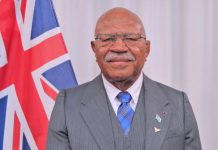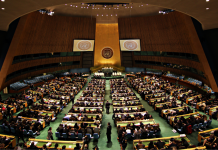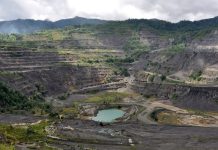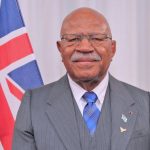The Papua New Guinea Government has reached a landmark achievement with the formal submission of its geographical co-ordinates under the United Nations Convention on the Law of the Sea (UNCLOS).
This submission reaffirms PNG’s territorial boundaries and maritime zones, securing its economic and strategic interests.
This development is particularly significant as PNG celebrates its 50th year of independence, marking almost five decades of sovereign governance.
Minister for Foreign Affairs Justin Tkatchenko said at the launching of the Marine Scientific Research Guidelines that the milestone reflects more than two decades of dedicated effort, beginning with initial submissions in 2002, followed by the latest update in 2024, which provides critical data on PNG’s baselines and the outer limits of its exclusive economic zone (EEZ).
He said the process has been supported by the South Pacific Community (SPC) through the Pacific Maritime Boundaries Project and its consortium of partners while the technical expertise provided by SPC has been crucial in ensuring PNG’s maritime boundaries are clearly delineated and legally recognised on the international stage.
He said the continuous work on this project highlights the strong partnerships with international donors such as the Australian Department of Foreign Affairs and Trade, the United Kingdom, and the European Union, whose financial and logistical support has been instrumental.
These collaborations have helped PNG overcome technical and legal challenges, bringing it closer to securing its maritime rights.
Amid global concerns over climate change, securing PNG’s maritime borders is of paramount importance. With rising sea levels threatening to redraw coastlines and potentially shift maritime boundaries, this submission underlines PNG’s commitment to protecting its sovereignty.
The assertion of these boundaries also has vital implications for fisheries enforcement, environmental conservation, and regional security, especially given the increasing geopolitical interest in the Pacific.
In line with the 2015 Pacific Islands Forum Leaders’ Declaration, PNG upholds the principle that maritime base points should remain permanent, irrespective of physical alterations caused by climate-induced sea-level rise.
This principle is crucial in safeguarding PNG’s sovereignty and ensuring that its maritime zones remain intact, despite environmental challenges.
Minister Tkatchenko said that as the region faces growing security concerns, including illegal fishing, transnational crime, and geopolitical pressures, the clear delineation of PNG’s maritime borders is critical.
He said this achievement will enhance national security, support sustainable fisheries management, and strengthen PNG’s position in regional and international affairs…..PACNEWS
COOKS – DIPLOMACY: RNZ PACIFIC PACNEWS 2: Tue 11 Feb 2025
China: Cook Islands’ relationship with Beijing ‘should not be restrained’
BEIJING, 11 FEBRUARY 2025 (RNZ PACIFIC) —China and the Cook Islands’ relationship “should not be disrupted or restrained by any third party”, Chinese Foreign Ministry spokesperson Guo Jiakun says, as opposition leaders in Rarotonga express a loss of confidence in Prime Minister Mark Brown.
In response to questions from the Associated Press about New Zealand government’s concerns regarding Brown’s visit to Beijing this week, Guo said Cook Islands is an important partner of China in the South Pacific.
“Since establishing diplomatic relations in 1997, our two countries have respected each other, treated each other as equals, and sought common development, achieving fruitful outcomes in exchanges and cooperation in various areas.
“China stands ready to work with the Cook Islands for new progress in bilateral relations.”
Guo said China views both New Zealand and the Cook Islands are important cooperation partners.
“China stands ready to grow ties and carry out cooperation with Pacific Island countries, including the Cook Islands.
“The relationship between China and the Cook Islands does not target any third party, and should not be disrupted or restrained by any third party.”
Guo added that Beijing would release information about the visit and the comprehensive strategic partnership agreement “in due course”.
However, Cook Islanders, as well as the New Zealand government, have been left frustrated with the lack of clarity over what’s in the deal which is expected to be penned this week.
United Party leader Teariki Heather is planning a protest on 17 February against Brown’s leadership.
He previously told RNZ that it seemed like Brown “is dictating to the people of the Cook Islands that I’m the leader of this country and I do whatever I like”.
Another opposition MP with the Democratic Party, Tina Browne, is planning to attend the protest.
She said Brown “doesn’t understand the word transparent”.
“He is saying once we sign up we’ll provide copies [of the deal],” Browne said.
“Well, what’s the point? The agreement has been signed by the government so what’s the point in providing copies.
“If there is anything in the agreement that people do not agree with, what do we do then?”
New Zealand’s Foreign Affairs office said Winston Peters has made repeated attempts for the government of the Cook Islands to share the details of the proposed agreement, which they have not done.
Peters’ spokesperson, like Browne, said consultation is only meaningful if it happens before an agreement was reached, not after.
“We therefore view the Cook Islands as having failed to properly consult New Zealand with respect to any agreements it plans to sign this coming week in China,” they said.
Prime Minister Brown told RNZ Pacific that he did not think New Zealand needed to see the level of detail they are after, despite being a constitutional partner.
Ocean Ancestors, an ocean advocacy group, said Brown’s decision has taken people by surprise, despite the Cook Islands having had a long-term relationship with the Asia superpower.
“We are in the dark about what could be signed and so for us our concerns are that we are committing ourselves to something that could be very long term and it’s an agreement that we haven’t had consensus over,” the organisation’s spokesperson Louisa Castledine said.
The details that Brown has shared are that he will be seeking areas of cooperation, including help with a new inter-island vessel to replace the existing ageing ship and for controversial deep-sea mining research.
Castledine hopes that no promises have been made to China regarding seabed minerals.
“As far as we are concerned, we have not completed our research phase and we are still yet to make an informed decision about how we progress [on deep-sea mining].
“I would like to think that deep-sea mining is not a point of discussion, even though I am not delusional to the idea that it would be very attractive to any agreement.,” she said.













